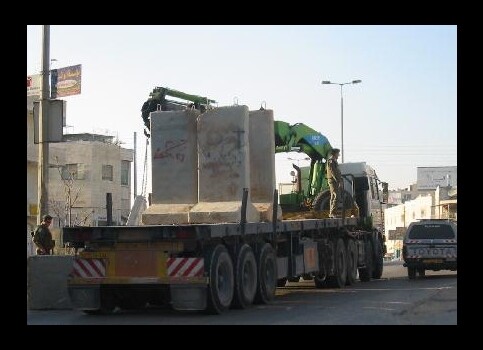17 March 2004

Construction of the wall in Ram (Photo: Melanie Bartels, 2004)
While deliberating on the petition’s submitted by ACRI today, the court ordered the temporary halt of construction work on the separation barrier on land belonging to the villages of Deir Qaddis, Ni’lin, both in the area of Modi’in.
The petition was submitted by ACRI Attorney Avner Pinchuk on behalf of the heads of the village. The petition against the barrier’s route within the boundaries of the village of Ni’lin was also submitted on behalf of an Israeli citizen from the neighboring Jewish rural residential community of Shilat.
The state announced that the residents of the village of Deir Qaddis will be given the opportunity to present their objections to the land expropriation by next Sunday, and that work will be halted anyway until the petition’s second hearing in a week’s time. With regard to the route of the fence that runs along land belonging to the village of Ni’lin, the state announced that work on the barrier would be stopped until such time as an alternative plan has been presented to the residents, after which they will be entitled to present their objections to the new route within a week. The petition was heard by Chief Justice Aharon Barak and justices Theodor Or and Eliahu Mazza. The Supreme Court also deliberated on a number of petitions today that related to the construction of other sections of the separation barrier.
Attorney Pinchuk explains in the petition that the planned route of the barrier, that runs through the land of the villages, deals a fatal blow to the livelihood of the residents by cutting them off from the majority of their agricultural land, and compounds the damage caused to the farmland by the construction of the barrier itself. In the past few days, Attorney Pinchuk further adds, numerous olive trees have been uprooted, some that are hundreds of years old. he also notes that, it is possible to change the route of the fence so as to prevent the serious infringement on the lives of the village residents without compromising the barrier’s security aims.
In the case of Deir Qaddis, Pinchuk adds, the work in the village is being carried out according to an invalid order: the order that was issued by the Head of Central Command in Arabic, and that orders the expropriation of the village’s land, did not contain vital details that appeared in the Hebrew version. The written notification of the village resident’s right to object to expropriation of land was removed from the Arabic version, thereby denying them the basic right to be heard before a decision is made on their behalf.
ACRI has submitted four petitions in total against the route of the separation barrier. The first petition was submitted two months ago by ACRI Attorney Fatmeh El-A’jou, and resulted in the court ordering the army to explain why the agricultural gates, through which the Palestinian population moves in and out of the seam zone, are closed for the majority of the day. Attorney Avner Pinchuk submitted the second petition that was directed against the regime of permit allocation imposed on the Palestinian residents of the seam zone, a declared closed military area. The first hearing on the petition was last month and no decision has yet been reached. The third and fourth petitions were submitted today to the Supreme Court.
Related Links